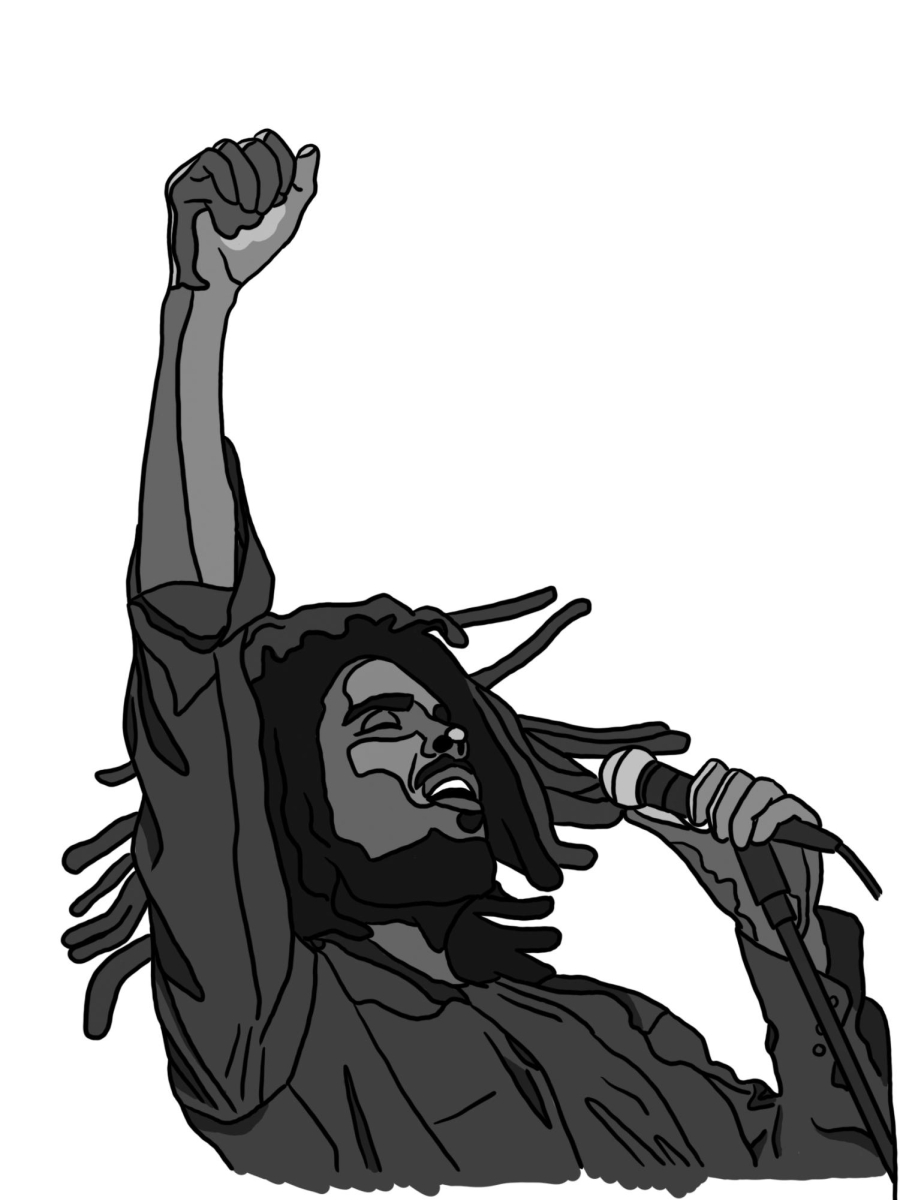“There’s a war going on; how can I bring peace? I can’t even get peace for myself,” attributes to Jamaican singer and guitarist Bob Marley. However, in the movie “One Love” it was the actor portraying Bob Marley who said it. The movie, “Bob Marley: One Love” was released on Feb. 14 and highlights Marley’s life from 1976 to 1978 in Jamaica, where two warring political parties competed for power. From facing political backlash to facing familial issues, Marley gave his heart and soul to his community through his songs, where he connected people of differing political views.
During this period, Jamaica was marked by political rivalry and social upheaval. The two major political parties — the Jamaica Labour Party and the People’s National Party —- battled for power, often resulting in violence that made daily life unbearable. This was seen throughout the movie.
At the time, Marley emerged not just as a musical icon at the time but as a beacon of hope and a common voice for peace.
“Love and acceptance was something that Marley preached and a lot of his music,” said Tyler Hanley, former Palo Alto Weekly film critic.
In the movie, the film captures the audience right away with close-ups that help the audience feel that they are present during band practices.
“I think they did a good job with that [close-up shots], when they bring you into these music scenes where he’s recording… then you do kind of feel there,” Hanley said.
Additionally, unlike many other biopic films such as ‘Elvis” in 2022, which covers broader periods of their subject’s life, this film focuses on a narrow period of Marley’s life.
As a result, the timeline feels jumbled and sometimes feels confusing as the audience may struggle to understand how much time has passed between each concert.
However, it does allow the movie to focus on the most important part of Marley’s life where he traveled the world and helped unite opposing leaders through his peace concert.
Furthermore, a recurring theme the movie showed was family, which played an important factor in Marley’s life.
The movie includes little details enhancing the experience of the movie; whether it was speaking like Marley or portraying the Jamaican culture with accents and cultural clothes.
The movie’s best part is the incorporation of each of Marley’s songs at appropriate times. Songs like “I Shot the Sheriff” were played right before Marley was shot and “Roots, Rock Reggae” which can be heard when Marley visits his family. In the song “Roots, Rock Reggae” “roots” can represent family as they are the stability of younger life and allow for growth.
Each song made by Marley helped mark a significant part of Marley’s life, such as the hardship he faced, the faith he had in building a community in Jamaica and the peace he longed for.
Marley, played by Kingsley Ben-Adir, always thought about others instead of himself by putting himself in danger and rarely thought about his selfish needs which was shown in the movie.
“I thought the lead actor, Kingsley Ben-Adir, was really good and probably will be on the Oscar stage someday,” Hanley said. “And then female lead, Keisha Lynch, she’s been doing a lot of great work and really showcased it there [in the movie] as well.”
One Love, while captures Marley’s struggle to bring peace through his peace concert, focuses predominantly on his persona as a global reggae superstar. It explores the hardship Marley had to deal with as a superstar where at times he felt betrayed by the people surrounding him.
This narrative choice raises questions about the portrayal of influential figures in movies. Marley’s music played a huge role in his peace-making efforts but the film seemed to give his activism, beliefs and the rich cultural context that influenced his music less prominence.
There is a selective approach to portraying influential characters in cinema,“You want conflict; people don’t want to see all the good stuff,” Michael Fisk, Executive producer of the biopic Ferrari said. “You have to show the tough life that they had, the fights that they had and so on. Some of it might not be as compelling so they kind of embellish parts of those stories.”
Although the movie shows conflict between family members and the Jamaican government, it failed to explore the bad decisions Marley made in his career.
“They [makers of Bob Marley] could have done better [to] shed some light on you know, some of Marley’s poor choices or not the best things that happened,” Hanley said.
Many biopic films like Bob Marley have tried to keep respectful towards the person to not tarnish their reputation.
“The issue I see very often is that certain biopic movies … are trying to be so respectful to the person that it doesn’t sound as exciting and it’s not showing as much conflict,” Fisk said.
Furthermore, movies like Bob Marley usually get the family’s approval before publishing to satisfy them
“I’d rather see more of erring on the side of accuracy and less on the side of making the family happy,” Hanley said.
Although the film received criticism, “Bob Marley: One Love” offers an engaging yet somewhat surface-like glimpse into the life of Marley. While the movie succeeds in showcasing Marley’s undeniable charisma, his musical impact and his care for the Jamaican people it falls short in diving into the complexities of his activism and how his culture influenced his music. Marley was more than a musician; he was a visionary whose legacy was deeply intertwined with his efforts to foster peace and unity in a divided country.






